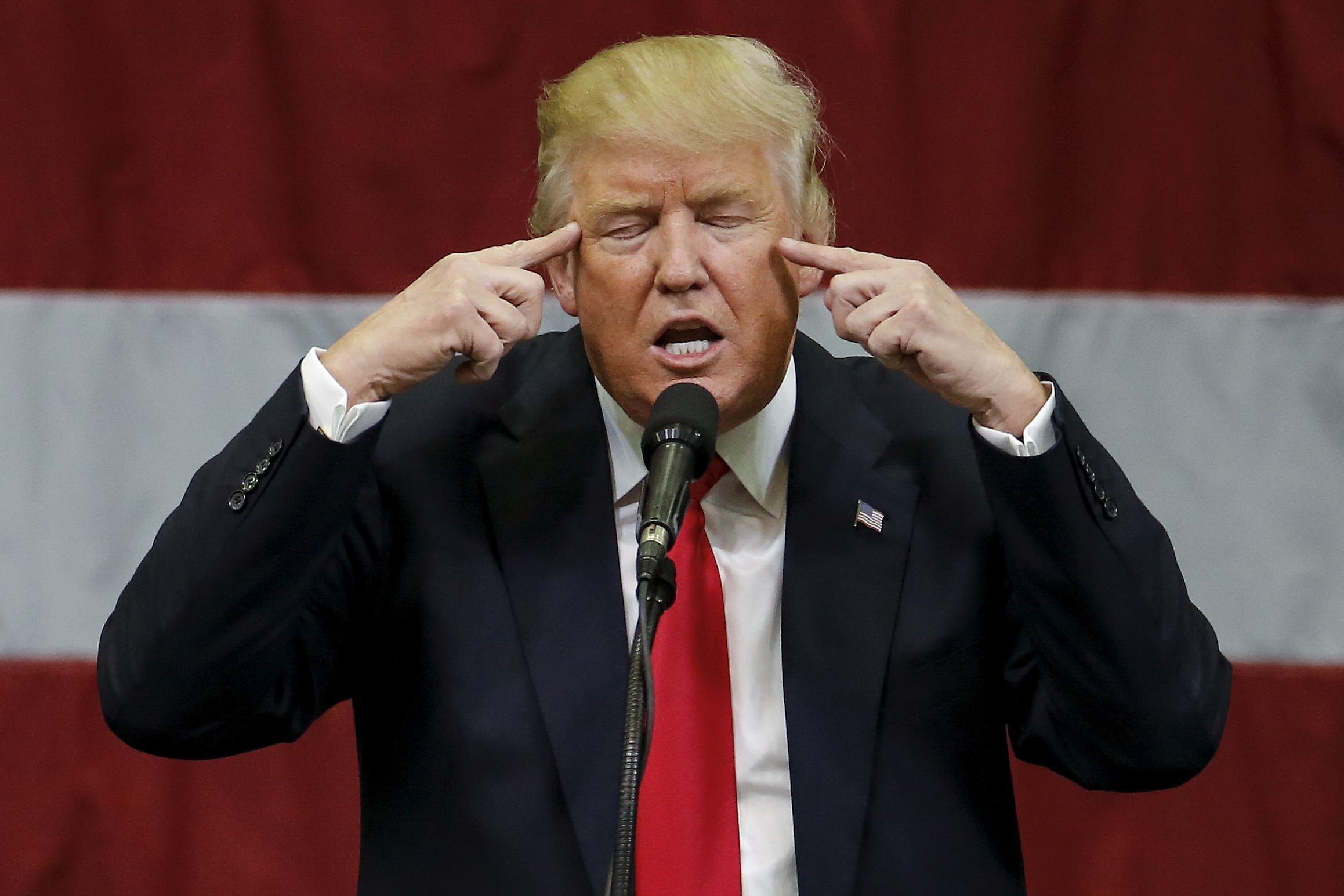Something is going on with Donald Trump
Is he trying to lose? Maybe. But only if he can blame someone else for the loss.


The media just can't shut up about Donald Trump. In no small part, this is because his behavior appears to be inexplicable.
Where the most gaffe-prone big-league politician might go off the rails once every week or so, Trump does it several times every week, and sometimes several times every day. And where the most gaffe-prone big-league politicians quickly take back their verbal flubs, clarify, and apologize, hoping to move on before inflicting maximal political damage on themselves, Trump invariably doubles down, needlessly dragging out the controversies for endless days.
This seemingly self-destructive behavior has spawned, in turn, a cottage industry of armchair psychologizing of the man, who's been repeatedly diagnosed as suffering from narcissistic personality disorder or maybe just "insanity."
The Week
Escape your echo chamber. Get the facts behind the news, plus analysis from multiple perspectives.

Sign up for The Week's Free Newsletters
From our morning news briefing to a weekly Good News Newsletter, get the best of The Week delivered directly to your inbox.
From our morning news briefing to a weekly Good News Newsletter, get the best of The Week delivered directly to your inbox.
Something is going on with Donald Trump. But we don't need a precise clinical diagnosis. It's possible to examine Trump's behavior over the past few weeks and reach a tentative understanding of his bizarrely self-subversive and flagrantly unpresidential statements and actions, including his tendency to flirt with inciting political violence.
Trump wants to lose the election. And he wants to be able to blame someone else for the loss.
Consider the evidence. Since delivering a rabblerousing populist speech at the Republican convention, Trump has done the following:
1. Attacked Ted Cruz's non-endorsement at the convention by way of re-raising the loopiest accusation he floated during the primaries: that Cruz's father was somehow involved in the assassination of John F. Kennedy.
A free daily email with the biggest news stories of the day – and the best features from TheWeek.com
2. Spent close to a week lambasting the parents of a dead soldier who delivered a high profile anti-Trump speech at the Democratic convention.
3. Made a point of refusing to endorse the sitting speaker of the House in a primary challenge. This lasted several days and ended with the endorsement being given after all.
4. Threatened to skip the presidential debates, even though he needs them far more than Hillary Clinton does.
5. Continued to allow the Clinton campaign to outspend him on television advertising at a rate of $52.3 million to…zero.
6. Suggested that if he loses to Clinton in November, it will be because the election was "rigged."
7. Implied that Clinton (or her judicial appointments) could face a threat of assassination by "Second Amendment people" if she wins and appoints anti-gun judges.
It's also worth noting that during this time, Trump's modest post-convention bounce rapidly disappeared, with the campaign entering a polling free-fall. At the moment Trump appears to be losing nationally by 7 to 8 percentage points, with Clinton more than 10 points ahead in states with a combined electoral vote total of 253 — just 17 short of what she needs to win. If this pattern continues, Trump will lose in a historic landslide.
So what can account for Trump's behavior?
At first sight, it appears perplexing. Items 1 to 5 seem to be the actions of someone deliberately out to sabotage himself. And some commentators have made exactly that claim: Trump wants to lose, because he feels he's in over his head, because he thinks the job would be too much work, or perhaps because his ultimate aim is to prepare for a post-election launch of a new right-wing cable network to compete with Fox News.
Item 6 seems to point in the opposite direction — toward such overabundant confidence and craving for victory that Trump can't envision any scenario, short of voter fraud, in which he loses. As for item 7 — Trump's convoluted insinuation that the country's most passionate supporters of gun rights might resort to political violence against Hillary Clinton or her anti-gun judicial appointments — it could be interpreted in either direction: as a sign that Trump sees himself at the head of a passionate political movement that is bound to prevail or yet another indication that he has no interest in doing the kinds of things (like reining in his most outlandish rhetoric) he would need to do to win.
But these two possibilities — a tendency toward self-sabotage and an overweening self-confidence — are actually not in conflict at all. The missing piece is the element of blame. Trump wants to lose — but he wants the loss to be someone else's fault. And he doesn't care if the object of scorn is the media, the Republican Party establishment, or the country's political establishment as a whole. All that matters is that his followers believe they, and he, have been robbed. Even if the resulting righteous indignation provokes political violence.
Two months ago my colleague Noah Millman pointed to precisely this kind of psychological dynamic in trying to figure out why Trump, shortly following his resounding triumph in the Republican primaries, chose to spend a week lashing out at Judge Gonzalo Curiel in racially charged terms when it had nothing whatsoever to do with his campaign for president and appeared to do that campaign nothing but harm. Millman's suggestion? The Trump University lawsuit wasn't going well, so Trump decided to throw anything and everything at the judge in the hopes that one of the accusations — the judge is a racist! — might stick and create an excuse to explain what would otherwise be a humiliating defeat.
Trump will do absolutely anything to avoid taking the blame for own failures, even (and perhaps especially) when his own actions rightly deserve the blame. And he couldn't care less about the civically ruinous consequences.
The Republican nominee is exceedingly likely to lose in November, but he won't be the only one dragged down by the defeat. All of us have now been reduced to playing bit parts in Donald Trump's personal psychodrama.
Damon Linker is a senior correspondent at TheWeek.com. He is also a former contributing editor at The New Republic and the author of The Theocons and The Religious Test.
-
 The elite falcon trade in the Middle East
The elite falcon trade in the Middle EastUnder the Radar Popularity of the birds of prey has been ‘soaring’ despite doubts over the legality of sourcing and concerns for animal welfare
-
 A running list of the international figures Donald Trump has pardoned
A running list of the international figures Donald Trump has pardonedin depth The president has grown bolder in flexing executive clemency powers beyond national borders
-
 Mixed nuts: RFK Jr.’s new nutrition guidelines receive uneven reviews
Mixed nuts: RFK Jr.’s new nutrition guidelines receive uneven reviewsTalking Points The guidelines emphasize red meat and full-fat dairy
-
 The billionaires’ wealth tax: a catastrophe for California?
The billionaires’ wealth tax: a catastrophe for California?Talking Point Peter Thiel and Larry Page preparing to change state residency
-
 Bari Weiss’ ‘60 Minutes’ scandal is about more than one report
Bari Weiss’ ‘60 Minutes’ scandal is about more than one reportIN THE SPOTLIGHT By blocking an approved segment on a controversial prison holding US deportees in El Salvador, the editor-in-chief of CBS News has become the main story
-
 Has Zohran Mamdani shown the Democrats how to win again?
Has Zohran Mamdani shown the Democrats how to win again?Today’s Big Question New York City mayoral election touted as victory for left-wing populists but moderate centrist wins elsewhere present more complex path for Democratic Party
-
 Millions turn out for anti-Trump ‘No Kings’ rallies
Millions turn out for anti-Trump ‘No Kings’ ralliesSpeed Read An estimated 7 million people participated, 2 million more than at the first ‘No Kings’ protest in June
-
 Ghislaine Maxwell: angling for a Trump pardon
Ghislaine Maxwell: angling for a Trump pardonTalking Point Convicted sex trafficker's testimony could shed new light on president's links to Jeffrey Epstein
-
 The last words and final moments of 40 presidents
The last words and final moments of 40 presidentsThe Explainer Some are eloquent quotes worthy of the holders of the highest office in the nation, and others... aren't
-
 The JFK files: the truth at last?
The JFK files: the truth at last?In The Spotlight More than 64,000 previously classified documents relating the 1963 assassination of John F. Kennedy have been released by the Trump administration
-
 'Seriously, not literally': how should the world take Donald Trump?
'Seriously, not literally': how should the world take Donald Trump?Today's big question White House rhetoric and reality look likely to become increasingly blurred
